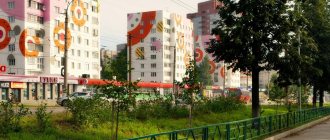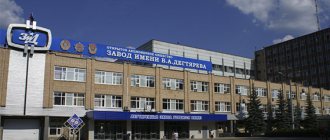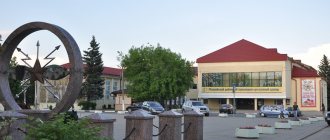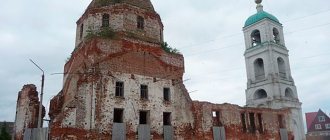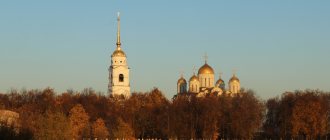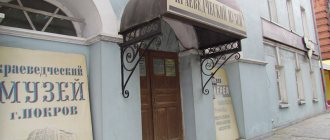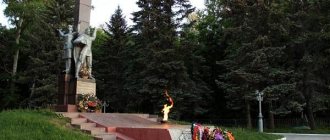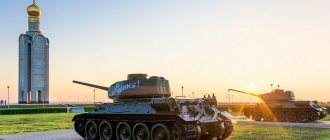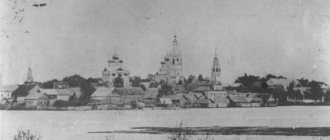Petushki: areas, recreation, excursions, museums and churches, cuisine and restaurants, shopping and shops, attractions of Petushki.
- May tours
to Russia - Last minute tours
to Russia
A small provincial town, a regional center, an inconspicuous point on the map of Russian tourism - this can be said about most cities in Russia, but not about Petushki. Every third compatriot who has heard the phrase “Moscow - Petushki” knows about the city with a population of only 15 thousand people. This is the title of a poem by Venedikt Erofeev, who only lived and worked in Petushki for a couple of years, but with his poem brought it into the country’s literary heritage.
A small provincial town, a regional center, an inconspicuous point on the map of Russian tourism - this can be said about most cities in Russia, but not about Petushki.
How to get to Petushki
Petushki is a city in the Vladimir region, connecting the once ancient capital of Rus' Vladimir with the modern capital. Just 120 km east of Moscow along the M7 highway, and you are in a quiet town, where there is room for both sightseeing and outdoor recreation. {{Slimness wallet| You can get here by train from the Kursky station (ticket price - from 376 RUB), or from the platforms of the Gorky direction, for example, from the Serp and Molot station near the Rimskaya metro station. Prices on the page are indicated for February 2022. By car, time in The journey will be only an hour; if there are no traffic jams, the train ride will take a little more than two hours.
Walk around Petushki
You should start your walk around Petushki with a visit to the Rooster Museum
, which is located on Sovetskaya Square in the building of the regional cultural center. The exhibition is entirely dedicated to the rooster; the museum has about 500 exhibits.
Rooster Museum
The Local Lore Museum is located nearby.
. There are four permanent exhibitions dedicated to the history of the region, the history of the city, local flora and fauna, as well as an exhibition of paintings by local painters.
Exposition of the local history museum
From the Museum of Local Lore you need to go to Kirov Street, where the Venedikt Erofeev Museum
, who wrote the story “Moscow - Petushki”. The museum is located together with an art gallery, and the exhibition is based on the writer’s personal belongings. About seven thousand people visit the Venedikt Erofeev Museum every year.
Museum of Venedikt Erofeev in Petushki
From Kirov Street you need to walk to the Petushkov railway station, where the Shukhov Tower
. It was built in the second half of the 19th century and serves as a water tower.
Shukhov water tower before reconstruction
You should complete your walk around Petushki with a visit to the Church of Afanasy Kovrovsky
(1st half of the 19th century), after the October Revolution it was closed and plundered. It was returned to the Russian Orthodox Church in 1992 and then restored.
Church of Afanasy Kovrovsky
A little history
The first mention of a settlement with the unusual name Petushki dates back to the 17th century, in the 19th century. The village of Petushki grew from the village of Starye Petushki. It became a city only in 1965. Tourists are usually of keen interest in the origin of such an unusual name. There are several versions to explain it: the popularity of cockerels-whistles in these places; the custom of placing a rooster's head in a corner when building a house; widespread use of the image of a rooster to decorate the lid over the chimney (smoke chamber); imitation of a cock's crow during raids on rich carriages - in the Vladimir region, according to folklore legends, this is how the gang of the robber Kudeyar operated.
Excursion: Petushki – Peksha – Rukav – Vladimir Excursion code: 6535
The city of Petushki arose as a settlement at the Petushki station (opened in 1861), named after the neighboring village of Petushki (now Starye Petushki). There are four legends that explain the name of the city: from local whistle toys in the form of cockerels, which were in demand at the Makaryevskaya and Nizhny Novgorod fairs; according to custom, the severed head of a rooster is placed in a corner at the foundation of the house; from chimneys in the form of roosters (they are still preserved on several houses); from robbers who attacked passing merchants at the crow of a rooster. The Church of the Assumption of the Mother of God was built on a place that since ancient times was called “Popovka”. According to legend, there was a wooden temple here, which was burned by Batu’s troops. The restored church was destroyed already in the Time of Troubles. Before the construction of the Holy Dormition Church began, the place was overshadowed by a wooden cross installed by local residents. The stone church began to be built at his own expense in September 1904 by Moscow industrialist and entrepreneur I.P. Kuznetsov, whose family’s fate was connected with Petushki. The unique three-part Church of the Assumption of the Blessed Virgin Mary was built in the Russian style, characteristic of the late 19th – early 20th centuries, and is a rare monument for the Vladimir region, which researchers attribute to a movement that is a type of late modernism. The interior decoration of the temple is of particular value. The amazing architectural space, picturesque decoration and objects of decorative and applied art have no analogues. The carved oak iconostasis is wonderful, against the general dark background of which the icons shine in gold. The picturesque ornaments of the temple, images of cherubs on the iconostasis, saints on the pillars and walls, as well as some subjects of wall paintings echo the monumental works of V.M. Vasnetsova, V.D. Polenova and others.
Not a single book dedicated to the history of the Russian Church in the 20th century can do without mentioning the name of St. Athanasius (Sakharov), Bishop of Kovrov . Afanasy was a delegate to the Local Council of 1917-1918. During the years of repression, he was arrested 11 times, went through 4 prisons and 5 camps, spent 22 years in prison and 7 years in exile. In 1919, during an “examination” in the Assumption Cathedral, he hid a particle of the relics of Abraham of Bulgaria from the atheists. In 1922, sitting in the Vladimir Central, he performed an unusual liturgy “To All Russian Saints”: “Holy Rus', keep the Orthodox faith, in it is your affirmation.” In March 1955 he was released and came to live in Petushki. Saint Athanasius lived the rest of his life in Petushki. The house where the saint died has been preserved. Pious parishioners turned this house into a small museum . Personal belongings remained in the room: a bed, a desk, icons, elements of vestments embroidered by the saint himself, a wooden panagia carved and painted by him.
Entertainment and attractions
As in all regional centers, the city has an Art Gallery and a Museum of Local Lore. But this is not symbolic. A representative attraction of Petushki is the Rooster Museum. Here you can see a whole set of different types of roosters, made in completely different genres. A racing rooster painted in Khokhloma, a rebel rooster made in Gzhel, a crystal brawler rooster or a clay bully rooster. You should definitely come here to learn about decorative and applied arts.
The “rooster theme” is not finished yet, but requires improvement. So, at the entrance to the city from the west there is a pedestal with the inscription “Petushki”, standing and waiting for it to be repaired or at least “washed”.
Another landmark of the city is the water tower of a smooth hyperboloid shape. This creation of the design of Academician V. G. Shukhov is very similar to the Moscow Tower on Shabolovka Street.
In Russia, there are only 8 such towers left out of 200 built throughout the country. It is believed that such buildings and the architecture of the famous Spanish architect Antonio Gaudi have something in common, for example, smoothness and streamlined forms. You can appreciate all this with your own eyes - fortunately, in Petushki the objects are within walking distance of each other.
And, of course, not a single Russian city can do without a church. There are two churches in Petushki, built almost 100 years apart. 1910 is the year of the consecration of the Holy Assumption Cathedral. 2002 is the year of the opening of the temple in the name of St. Athanasius. 5 km from the city in the village of Leonovo there is another Epiphany Church built in 1820. Pilgrims should visit the local holy places. It is incredibly quiet and peaceful around them.
Small towns of Russia: Petushki
Cockerels
The city of Petushki is the administrative center of the Petushinsky district of the Vladimir region, one of the smallest cities - with a population of 13,382 people (2017). Petushki is located on the left bank of the Klyazma River, 63 km southwest of Vladimir. The Moscow-Nizhny Novgorod railway and the M-7 Volga highway pass through the city.
Story
Petushki is a provincial town that was a village half a century ago. It arose at the Petushki station, opened in 1861. The station was named after the neighboring village of Petushki (today it is Starye Petushki). This village was first mentioned in church census books in 1678. Residents of Petushki have long been engaged in “janitoring”, that is, maintaining inns, which was determined by the location of the village - on the high road running from Moscow to Vladimir, and then to Nizhny Novgorod.
Since the 18th century The Vladimirsky tract (the notorious Vladimirka) was used to send convicts to Siberia for hard labor. The prisoners, shackled, were “led along the stage” on foot in small detachments-parties. After walking 15–25 versts (stage), the prisoners stopped for a rest. The tragic history of the road inspired the artist I.I. Levitan to create the painting “Vladimirka” when he was on vacation in these places in 1891 (now the museum “House of Landscape named after I.I. Levitan” has been opened in the village of Eliseikovo, Petushinsky district).
The railway under construction determined the transition of part of the residents of the village of Petushki closer to it and the formation of a settlement with a wooden railway station. By 1869, when double-track train service appeared, a large brick station (still preserved) and a locomotive depot were built at the station. The station became the administrative station, where locomotives were changed, inspected and repaired, and work on the loading and dispatch of timber and firewood was expanded. Along with the station, the settlement grew, turning into the station workers' village of Petushki.
There are many interpretations of the name of the settlement - Petushki. The most peaceful of them are associated either with the traditional production in these places of children's whistles in the shape of cockerels, which were in great demand at the Nizhny Novgorod and Makaryevskaya fairs, or with the rooster-shaped chimneys common here, which are still preserved on some houses. But there are also quite sinister interpretations: robbers, who have long traded on the high road, attacking passing merchants, warned of their appearance by the crowing of a rooster. And also, supposedly, there was a custom, apparently for good luck, of placing the severed head of a rooster on the corner of the foundation when laying a house. Whatever the version, cockerels - the symbol of the city - are today depicted on the official coat of arms, approved in 2009.
The construction of the railway attracted entrepreneurs, and in the 1910s, industrial production began to emerge in Petushki: the Krasheninnikov brothers built a weaving factory for 50 handlooms (later - the Trudovoy Collective factory); entrepreneur Dyukov opened a pleat-cutting artel producing velvet; the turning and carpentry factory of Drozhzhin and Efremov was founded, which later became a bobbin-and-reel factory; The Genushkevich plant began producing sand-lime bricks.
The village of Petushki received the status of a village in 1910, when a magnificent temple built here at the expense of the local manufacturer Kuznetsov - the Holy Assumption Church, which is still in use today - was consecrated.
The station village developed, attracting the surrounding population, and expanded with new streets. In 1928, it received the status of an urban-type workers' settlement and was renamed Novye Petushki. In 1929, it became the center of the first formed Petushinsky district. Petushki became a city only in 1965.
Economy
Today Petushki, although a small town, is still an industrial center with a number of enterprises, including such a unique and promising plant as a steel piston ring plant. Still, the main range of production is light industry, mainly textile and food industries.
Attractions
Of tourist interest may be one of the eight hyperboloid towers preserved in Russia, designed by the engineer and scientist V.G. Shukhov (the most famous Shukhov tower on Shabolovka in Moscow). He was the first in the world to create such a steel mesh structure for the All-Russian Exhibition in Nizhny Novgorod in 1896. However, the condition of the Petushin water tower today is quite deplorable.
The city has the only Rooster Art Museum in Russia, founded in 1997 by artist and journalist N. Kornilov. The museum contains a large collection of paintings, dishes, embroidery, and installations made from various materials on a “rooster” theme, which is of great interest to both children and adults. The museum is located in the district House of Culture.
Famous people
The city entered the Russian cultural context after the appearance of V. Erofeev’s poem “Moscow - Cockerels” (1970, officially published in the USSR only in 1988). Venichka Erofeev himself lived in Petushki for no more than two years. He first came here in 1959 and got a job as a loader at a cement warehouse. Contrary to popular belief, there is no monument to Venedikt Erofeev in Petushki. In 2000, a monument to Erofeev was erected in Moscow, in a public garden on Borby Square (Mendeleevskaya metro station). A small museum of the writer has been created in Petushki (Sovetskaya Square, 3), the exhibition of which presents the writer’s personal belongings, literally collected bit by bit from all over Russia.
Author: V. Korolkova
Leisure
We advise residents of large cities to go to Petushki to relax in the fresh air. There are all possibilities for this.
For a wild holiday, you can pitch a tent near a pond.
Fortunately, there are enough of them here: the Klyazma and Berezka rivers, lakes Gribovskoye, Chupriyanovo, Bogdarinskoye, Ignatkovo and several quarries. The Moscow public prefers to go to Petushki on weekends to relax at tourist centers and boarding houses, so it is better to book them in advance in the summer and during the holidays. There is excellent fishing and rich berry and mushroom spots.
Route Moscow - Pokrov - Petushki - Vladimir
Hi all! I propose another weekend route Moscow - Pokrov - Petushki - Vladimir. I’ll point out a lot of interesting places on the M7 highway where you can go for the weekend.
So, the road trip along the route Moscow - Pokrov - Petushki - Vladimir is laid along the Volga highway. The first stop is after about 100 km in the city of Pokrov.
Here you can look at the interesting exhibitions of the local history museum. The museum is located on the street. Lenina 79, coordinates E039 10.667 N055 55.084, tel. 49243 code 622 14
Here, in the same building, is the Chocolate Museum, where they will tell and show the history of the development of the confectionery business.
After the Intercession, the famous Petushki will stand on the way. Not far from the main road, it’s worth visiting the Rooster Museum. A wide variety of cockerels are exhibited here. The Rooster Museum is located at Sovetskaya Square 2, coordinates E039 27.682 N055 55.858, telephone 49243 code 219 80, it is closed on Monday and Sunday, and it is better to check by phone about working hours.
Then you need to drive again along the M7 highway and after about 60 km Vladimir will appear on the horizon. You can walk around Vladimir for a very long time. An ancient beautiful city, perhaps one day will not be enough. I'll just mention a few attractions.
The stone carvings on the façade of the building are amazing and there is an exhibition inside.
You can get to the Demetrius Cathedral from 11 to 18 o'clock; on Tuesday and the last Wednesday of the month it is closed. Tel. 492 code 324 263 coordinates E040 24.650 N056 7.744
A building of incredible beauty. The walls are covered with frescoes painted by Rublev. You can feel strength, power, spirit in everything. This is a whole complex of structures that began to be built back in 1158.
The Assumption Cathedral is open from 13.30 to 16.30, closed on Monday. Phone 492 code 324 263, coordinates E040 24.550 N056 7.630
Museum of Lacquer Miniatures and Crystal
An interesting museum for children and adults is located on Dvoryanskaya Street 2, coordinates E040 23.786 N056 7yu569, open from 10 to 18, on Wednesday and Monday until 16
In order to learn more about Vladimir and go further, you can stop here for the night. Here are the addresses and telephone numbers of several hotels.
Hotels in Vladimir
Different rooms, cost from 1200 rubles. There is a sauna and swimming pool. Address st. Green, 17, tel. 4922 code 425 179, gladiatorotel.ru
Mini-hotel Day and night
Mini-hotel "Day and Night" offers 2, 3, and 4-bed rooms. Cost from 700 rubles, and breakfast is included in the price. Hotel address st. Green 17, tel. 960 73389 63
Offers rooms of varying comfort. Price from 1200 rubles. The Klyazma Hotel is located at Sudogodskoye Highway 15, tel. 4922 code 324 237, klyazma-hotel.ru
Hostel Vinyl is located in the city center, next to historical monuments. Cost of living from 500 rubles. Address Studenaya Gora, 14 kv 12, telephone numbers 4922 code 474 601, 920 94478 88, vinylhostel.com
Hotel Mont Plaisir
The Mont Plaisir Hotel is located near the center and has a fitness center and billiards. Address st. Razina 20 a, 4922 code 373 775, Vladimir-monplaisir.ru
It is clear that there are many more hotels and inns in Vladimir, you can choose one to suit every taste. But for a weekend route it is enough. You can find a motel on the M7 highway so you can hit the road without wasting time in the morning.
Please add your reviews about the attractions of this weekend route and send your travel reports and videos. For more trip reports and weekend itineraries, check out this space and here .
Economics [ | ]
Main industrial enterprises:
- (Icopal) (production of roofing and waterproofing materials);
- food processing plant (canned fish and seafood);
- piston ring plant "Stakol" (OMZSO) (production of steel piston rings for internal combustion engines);
- knitting factory (knitwear, knitwear);
- PJSC "Vatin" (batting, non-woven materials and fabrics, technical fabrics) The factory was closed in 1999;
- (heat exchange equipment, pipeline parts);
- experimental mechanical plant for special equipment of the Glavspetspromstroy management;
- (wood processing);
- sand-lime brick plant;
- butter cheese;
- printing house;
- sandwich panel production plant "Termokontur";
- (production of special-purpose vehicles and Eurocontainers for municipal solid waste).
